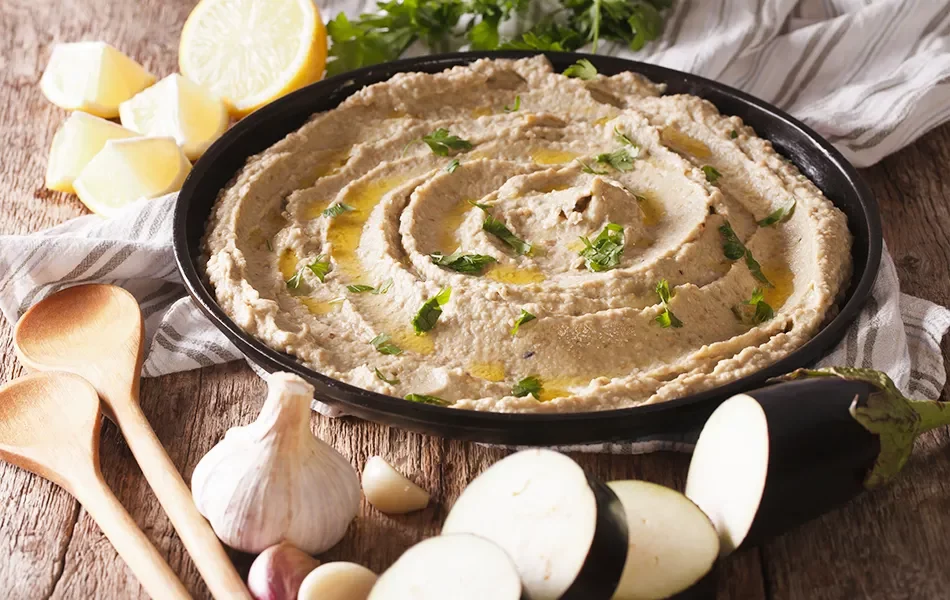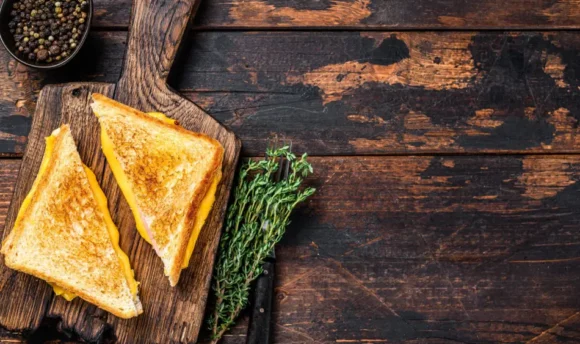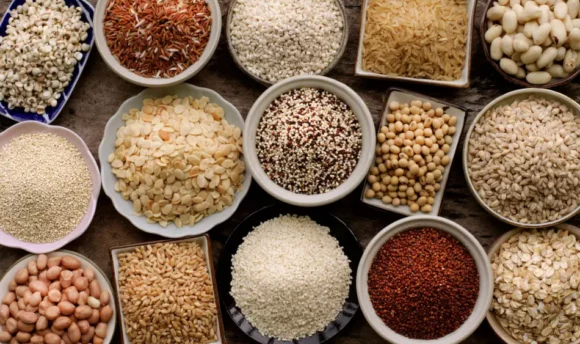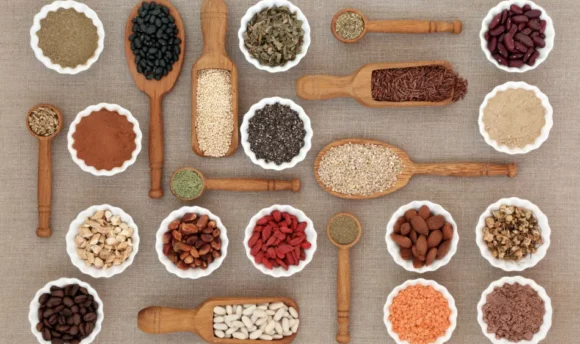Is Baba Ganoush Healthy? A Health-Conscious Guide to This Dip
Dip into good health with baba ganoush: unraveling the nutritional treasures of eggplant and Mediterranean flavors.

Baba ganoush stands out among flavorful and nutritious dips for its rich texture and exquisite blend of ingredients. A delicious Mediterranean dip, often served with pita bread or as a side dish, has gained considerable popularity in recent years.
Although baba ganoush is a culinary delight, health-conscious individuals often wonder, “Is baba ganoush healthy?”
Whether you’re a food lover seeking new flavors or someone focused on maintaining a balanced diet, we invite you to join the Health Reporter team as we explore its origins to uncover its health benefits.
Is Baba Ganoush Healthy?
Baba ganoush is a healthy choice because it contains nutritious ingredients like eggplant, which has few calories and a high fiber content. Additionally, it contains antioxidants and healthy fats from tahini and olive oil. The nutritional value and delicious flavors of baba ganoush can be enjoyed as part of a balanced diet.
Even though this dip has numerous health benefits, its nutritional value varies depending on the recipe and serving size. When making homemade baba ganoush, you can further enhance its healthfulness by tracking your portion sizes and adding fresh, high-quality ingredients.
What Is Baba Ganoush?
Traditionally originating from the Middle East and the Mediterranean, baba ganoush is a savory dip or spread. It is made by roasting or grilling eggplant and mixing tahini (a sesame paste), garlic, lemon juice, olive oil, and various spices together. This dip’s smoky flavor comes from the eggplant, which is the main ingredient.
In Mediterranean cuisine, baba ganoush is a popular and versatile dish because of its creamy texture and rich flavor. It is usually served as a dip with pita bread, fresh vegetables, or as a spread for sandwiches and wraps.
Baba ganoush ingredients
Whether it’s the smoky roast eggplant or the creaminess of tahini, each of these components plays a crucial part in defining baba ganoush’s character. Discover the nuances of its key ingredients as we explore the essence of this dip.
Eggplant
An eggplant that has been roasted or grilled is the cornerstone of baba ganoush, giving it its smoky and robust essence. Through cooking, the eggplant’s tender flesh becomes creamy, forming the dip’s base.
Tahini (sesame seed paste)
Tahini is derived from toasted sesame seeds, giving baba ganoush its characteristic nutty undertones and smooth texture. Tahini also contains healthy fats, proteins, and essential minerals, which elevate the nutritional value of the dip.
Garlic
Baba ganoush’s savory flavor is enhanced by garlic, which adds depth and aromatic notes. As well as improving taste, garlic is believed to have immune-boosting properties and cardiovascular benefits.
Lemon juice
Baba ganoush is tangy and citrusy, thanks to the addition of freshly squeezed lemon juice. In addition to enhancing the dip’s flavor, this acidity also balances out the richness of other ingredients, offering a refreshing element.
Olive oil
Olive oil adds a smooth and silky texture to baba ganoush. The heart-healthy monounsaturated fats in olive oil, especially extra virgin olive oil, contribute to cholesterol management and may reduce cardiovascular disease risk.
Spices
This popular dip can be enhanced with cumin, which adds a warm earthy note, and paprika or cayenne pepper, which adds a subtle hint of heat. A variety of spices adds complexity to the dip’s flavors, elevating the sensory experience.
Baba Ganoush Nutrition
Baba ganoush can be a great addition to your daily diet if you are looking to nourish your body. In this table, you will find the main nutritional values of this healthy eggplant dip.
| Calories/Nutrient (per 100g) | Amount |
| Calories (kcal) | 162 |
| Net Carbs (g) | 5.46 |
| Fiber (g) | 4.1 |
| Sugar (g) | 2.81 |
| Fats (Total) | 13.2 |
| Protein (g) | 4.26 |
| Sodium (mg) | 219 |
| Cholesterol (mg) | 0 |
| Total saturated fat (g) | 1.9 |
Source: https://fdc.nal.usda.gov/fdc-app.html#/food-details/2345576/nutrients
How many calories are in baba ganoush?
Baba ganoush typically contains around 162 calories per serving. This calorie count is influenced by the ingredients used in its preparation, such as roasted eggplant, tahini, garlic, lemon juice, olive oil, and spices.
While eggplant is relatively low in calories, tahini and olive oil are higher in calories due to their fat content. However, it’s important to note that the calorie count may vary based on specific dip recipes and serving size.
Health Benefits of Baba Ganoush
Eggplants stand out for their culinary versatility, characteristic flavor, and potential health benefits, here we describe some of them:
#1 Nutrient-rich ingredients
Baba ganoush is a flavorful dip that boasts a variety of nutrient-rich ingredients. The eggplant and lemon juice provide vitamins and minerals, while tahini contributes healthy fats, protein, and essential minerals.
Additionally, the inclusion of garlic adds potential immune-boosting benefits. Combined together, these ingredients create a nutrient-packed dip that not only delights the taste buds but also nourishes the body.
#2 Antioxidant and anti-inflammatory properties
Eggplant, a primary component of baba ganoush, contains antioxidants such as nasunin. Nasunin is known for its ability to fight free radicals and protect cells from oxidative stress, potentially reducing the risk of chronic diseases and supporting overall well-being.
Garlic, another notable ingredient, contains sulfur compounds like allicin, which have been linked to anti-inflammatory effects. And lemon juice contains flavonoids and vitamin C. These compounds may help reduce inflammation in the body, supporting a healthy immune system and potentially mitigating the risk of certain chronic conditions.
#3 High in dietary fiber
Eggplants are naturally rich in dietary fiber. Fiber is the indigestible part of plant foods that provides several health benefits. It adds bulk to the diet, promoting feelings of fullness and aiding in weight management.
Tahini paste, made from ground toasted sesame seeds, also contributes to the dietary fiber content of a healthy eggplant dip.
Downsides of Baba Ganoush
When baba ganoush is prepared for sale in the markets, it is important to check the ingredients to avoid eating an unhealthy indulgence that will prevent you from taking advantage of its benefits. Some downsides that this spread can have are:
#1 High in calories
The calorie content of an eggplant dip may vary depending on the quantities of each ingredient in the recipe. However, it is often high in calories.
One factor that can contribute to the calorie content is the amount of tahini and olive oil used. While tahini adds creaminess and flavor to baba ganoush, it is relatively high in calories due to its fat content. Similarly, olive oil, when used in larger quantities, can contribute to the calorie count.
Also, serving size plays a significant role. If larger portions of baba ganoush are consumed, the calorie intake will naturally be higher.
#2 High in sodium
The sodium content can vary depending on factors like the use of commercially prepared tahini with added salt, seasonings that may contain sodium, and the addition of salt for flavor.
Opting for low-sodium tahini, choosing low-sodium seasonings, or reducing added salt can help lower the sodium levels. Homemade versions also allow for better control of sodium content.
#3 Might cause allergies in some
The primary ingredients of concern are eggplant, sesame seeds (found in tahini), and garlic. Allergies to these ingredients can vary in severity, ranging from mild discomfort to more severe reactions.
Best Healthy Baba Ganoush Recipe
Baba ganoush caters to all dietary preferences, whether you are vegan, vegetarian, or gluten-free. Here’s a simple and healthy baba ganoush recipe for every taste:
Ingredients:
- 2 medium-sized eggplants
- 2 tbsp tahini
- 2 garlic cloves, minced
- Juice of 1 lime or lemon juice
- 2 tbsp extra virgin olive oil
- ½ tsp ground cumin
- Salt and pepper, to taste
- Fresh parsley, for garnish (optional)
Instructions:
- Preheat the oven to 400°F (200°C). Line a baking sheet with parchment paper.
- Wash the eggplants and pat them dry. Use a fork to poke several holes around each eggplant.
- Place the eggplants on the baking sheet and roast in the preheated oven for 40–45 minutes or until they are soft and the skin is charred. Turn the eggplants halfway through the cooking process for even roasting.
- Remove the eggplants from the oven and allow them to cool for a few minutes. Once cooled, carefully peel off the charred skin and discard it.
- Chop the roasted eggplant flesh and transfer it to a bowl.
- Add tahini, minced garlic, lemon juice, olive oil, ground cumin, salt, and pepper to the bowl with the eggplant.
- Use a fork or a blender to mash or blend the ingredients together until you achieve a smooth and creamy consistency. Adjust the seasoning to taste.
- Transfer the baba ganoush to a serving dish. If desired, drizzle with a little extra olive oil and garnish with fresh parsley.
- Serve the eggplant dip with whole-grain pita bread, fresh vegetables, or as a dip alongside your favorite dishes.
Enjoy this homemade, healthy baba ganoush recipe as a delicious and nutritious addition to your meals or as a flavorful dip for snacks or to add to other dishes.
FAQs
Baba ganoush and hummus are both nutritious options, but their healthiness can vary based on specific recipes. Moderation is key for incorporating these dips into a healthy diet.
Yes, baba ganoush can be beneficial for gut health. It contains dietary fiber that acts as a prebiotic, nourishing the beneficial bacteria in the gut and aiding in overall gut health.
Yes, baba ganoush tends to be lower in calories compared to hummus. This dip is primarily made from eggplants, which have fewer calories compared to the main ingredient in hummus, which is chickpeas.
A Word From a Nutritionist
Incorporating this dip into a healthy lifestyle is all about balance and mindful choices.
First, keep portion sizes in check to manage calorie intake and prevent overindulgence if you are looking to lose weight or control blood sugar. Stick to a reasonable serving size, pairing the dip with fresh vegetable sticks for added fiber and nutrition.
Choosing homemade baba ganoush allows for better control over ingredients like oil and salt, enabling a healthier version tailored to personal preferences. By preparing it yourself, you can ensure that the dip is made with fresh, quality ingredients and adjust the flavors to suit your taste.
Lastly, consider this eggplant dip as part of a well-rounded meal. Include lean proteins, whole grains, and additional vegetables on your plate to create a balanced and nutritious combination.
Conclusion
Baba ganoush offers a range of nutritional benefits, including dietary fiber, vitamins, and healthy fats.
It is a delicious and versatile dip that can be enjoyed in various ways. It can be paired with fresh vegetables or used as a spread in sandwiches, pita chips, or wraps.
Practicing portion control, opting for homemade versions to control ingredients, and balancing the dip with other nutritious foods is key to enjoying it in a healthy way.

















































 Select your language:
Select your language: 








